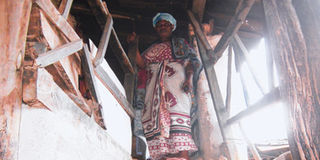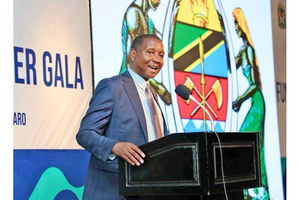Mandela hid in my house for six months

Ramla Kibwana (Left) stands at the top of the stairs leading to the room in which Mandela and his fellow freedom fighters used to hide and above, the room upstairs where Mandela and colleagues used to stay.
PHOTOS | ESTHER MNGODO
What you need to know:
Both her parents were deceased and so she lived with her grandmother, her aunt and seven children. The oldest was 28 while the youngest was just a teenager.
A year has passed since Nelson Mandela, the South African apartheid revolutionary passed on. Many across Africa and across the world reverenced him for his courage and the spirit of forgiveness, which he upheld. Tanzania is known to be a friend of Madiba for its role in the freedom fighting movement. Apart from the national heart-felt contribution, individuals also share personal experiences of how they opened their homes to South Africa during that time.
Some stories were highlighted at the time of Madiba’s funeral, such as that of Vicky Nsilo Swai, a Tanzanian woman who kept Nelson Mandela’s shoes for 33 years in her home. But little is spoken about Ramla Kibwana, a ten cell leader in Soko Matola area in Mbeya city who claims to have given refuge to Mandela and his friends when they were on the run. She was a ten cell leader when Mandela arrived at her home back then.
Mama Kibwana recalls the words Nelson Mandela used to introduce himself to her after months of hiding in her house vividly. ‘Mimi ndio Mandela’ (I am Mandela), he said to her in Kiswahili. Mama Kibwana can clearly remember the six months Mandela spent in her house. Although she cannot recall the year, she clearly remembers a young man who she identifies as Mzee Mwembapa’s son knocking on her door at around 9:pm with two strange men. Their clothes were torn and their trousers were supported by suspenders. The young man who brought them told her that the two men had been sleeping in bars in Mabatini area, just a short distance from Soko Matola and needed a place to stay for a while. “I pitied them,” she says and adds: “It was at a time when many African countries were seeking independence. The young man told me that the men were from South Africa. So I knew what I was getting myself into.”
Officials from the South African High Commission in Dar es Salaam are unable to verify Mama Kibwana’s account. However, Mama Kibwana says that what she did was a heroic act. She doesn’t understand why her family was never commended for it. Mama Kibwana didn’t know the men’s identity. And when they came with two other men on the second day, she was satisfied with the names that they mentioned to her.
It wasn’t until later that she came to learn that her South African guests were Mandela and a man who she recalls as Makubalo. At first, Mama was hesitant to retell the story to yet ‘another journalist.’ “Journalists have documented my story in the past. One even gave me Sh 1,000 after the interview. I felt so disrespected. I wonder what the point is in telling my story if no one can even come back to say ‘Thank you, what you did was brave’. I see no point,” she says.
The story of her family’s heroic act takes Mama Kibwana back to the days when the roof of her house wasn’t falling and the staircase to the first floor where Mandela and his comrades were hiding was strong. The house is located at the junction of Kanisa Street and Barabara ya Tano. This is where Mama Kibwana grew up. Her father gave her the house since she was the only child. Now, it is home to five other families, each paying Sh10,000 as rent per month.
When Mandela and his friend were introduced to her, she was selling Kimpumu, some local brew made from millet. She offered them some before they left an hour and a half later. Since they spoke very little Swahili, the young man who brought them was their translator. He spoke some English. It was around 10:30 pm when they returned to Mama Kibwana’s the following day. They were quite restless, she says. They would get on their feet on hearing someone knocking and couldn’t sit still. Mama Kibwana wasn’t afraid to host them even though she had a whole family depending on her.
Both her parents were deceased and so she lived with her grandmother, her aunt and seven children. The oldest was 28 while the youngest was just a teenager. Only two among the seven, a son and a daughter are living.
“I told my family to keep this a secret. It wasn’t hard for me because I didn’t have any girlfriends to worry about. I was certain that no one would gossip about it. I was the only child to my parents and had grown up to be very independent. And at the time, my husband and I were already divorced,” she explains.
When the men came, Mandela’s leg was swollen. They were four this time. Mama Kibwana said that she mixed some flour, eggs and herbs and massaged him. It took about three weeks for him to recover.
“Their clothes were very dirty. I gave them my vitenge (African print wrap-around) and washed their clothes. I bought clothes for them two weeks later. And a week later, I bought some more for the other two,” she says. Second hand clothes were famously known as ‘mitunguo’ back then as they were sold on hangers. The cheapest would go for Sh 50 while the most expensive one could cost Sh 200.
The room Mandela slept in was on the first floor. It has a tiny window through which they could see the street outside, but the ones outside could not see them. “I had to create a veranda on the inside where they could rest during the day and get some fresh air. But there was no way they could walk outside during the day,” she explains.
With now four more mouths to feed, Mama Kibwana had to work harder. Mandela had given him Sh 500 the first day he came for the local brew she sold them. But he never gave any financial contribution afterwards. At first she used to buy two debes of the local brew for her business, but later on, she decided to make it herself so as to cut costs. She sold one litre of the local brew for Sh 100.
In the earlier days of their stay, Mandela and his colleagues didn’t eat much, Mama Kibwana says. She decided to join them during lunchtime so that they would be more at ease. “Whatever I ate, they ate as well,” she says adding that Mandela loved Ugali and fish. He didn’t like beans that were cooked with tomatoes and other vegetables. He just wanted them boiled. Makubalo’s favourite was Ugali with mlenda. She smiles at the thought of Makubalo calling out to her: “Mama kama malenda ipo nipe,” she mimics how he would ask for Mlenda and laughs. She says Makubalo didn’t have most of his front teeth.
According to Mama Kibwana, the men used to wake up at 6am to take breakfast. But later on, they would shower at 5am and then go back to bed until 8am when they had breakfast. They used to sleep a lot in the beginning. “I guess they were very tired from all the running,” she says.
Their host would put two buckets in the room for them to relieve themselves whenever they needed to instead of going to the toilet downstairs, just in case there was a guest and he saw them. One would be full of water and the other would be empty. And if they ever went out, it only happened at night. They would never go out together, but one at a time.
“Four months on, I remember hearing on the 4pm evening news on Radio Tanzania that they were looking for a South African man named Mandela. For about half an hour, I sat there wondering what I was going to do. Although I didn’t know if Mandela was among the men in my house, I knew that there was that possibility. I feared for my life. I was torn between kicking them out and calling the police. But I knew they had nowhere else to go to,” she says.
As she served them food that evening, Mama Kibwana told them about the news on the radio. “Mandela himself responded, but of course I didn’t know that it was him all this time. He said ‘Oh Mandela. I wonder where he went. You know we all left in a hurry and it has been a long journey from South Africa. We do not know where he went.’ He misled me,” she says with a chuckle.
It wasn’t until a few days later when he revealed his true identity. She remembers him saying: ‘Mimi ndio Mandela.’ (I am Mandela). Mama Kibwana was shocked and just muttered: ‘Alhamdulillah’ (Which is Arabic for All praise and thanks to God). “He asked me why I gave such a remark, and I told him that I was grateful to God,” she says. The Kibwana’s had also been fortunate to host the late Mwalimu Nyerere at some point in history, according to Mama Kibwana.
“There are several homes here in Mbeya which once provided refuge to politicians during the independence era. But I am surprised that nothing is being done to even say ‘Thank You, your courage is recognised and appreciated’,” she says bitterly.
Email: [email protected]




